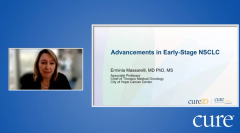
Educated Patient® Lung Cancer Summit Advancements in Small Cell Lung Cancer Presentation: June 25, 2022
Watch Dr. Ravi Salgia, from City of Hope, discuss advancements in small cell lung cancer during the CURE Educated Patient Lung Cancer Summit.
Episodes in this series

Decades ago, lung cancer was broadly diagnosed as one disease. But thanks to scientific advancements, clinicians now know that there are two distinct types of lung cancer: small cell and non-small cell. With the former still lagging behind the latter when it comes to certain treatment advancements, explained Dr. Ravi Salgia.
“As soon as somebody is diagnosed with small cell lung cancer, you have to (question if it is) within the chest cavity or has it spread beyond the chest cavity?” Salgia, professor and chair of medical oncology and therapeutics research at City of Hope in Duarte, California, said in his presentation at the CURE® Educated Patient® Lung Cancer Summit.
Limited Disease
Salgia explained that small cell lung cancer can also be classified through staging using tumor size, nodal status and metastasis spread, or TNM.
Patients with limited disease, those who are “truly stage 1” may be treated with surgery followed by chemotherapy, Salgia noted. But if there is lymph node involvement, patients may undergo chemotherapy and radiation therapy, followed by prophylactic cranial irradiation, a process intended to help prevent the spread of cancerous cells and recurrence in the brain.
Patients whose disease progressed, however, may want to consider participation in a clinical trial, Salgia said.
“I can't emphasize clinical trials enough. Even in stage 1 disease, if the survival is, let's say, only about 30%; we have to make a difference for the 70% of the patients in the limited disease (space). So, if patients can go on a clinical trial, that's even better,” Salgia said, adding that the usual treatments for small cell lung cancer have remained largely unchanged in the last three decades. “We still give cisplatin or carboplatin with etoposide, and we know that there is no observed benefit to therapy in more than four to six cycles, so we really have to make a difference.”
Metastatic Small Cell Lung Cancer
Immunotherapy agents such as Opdivo (nivolumab) and Keytruda (pembrolizumab) — which have led to landmark improvements in non-small cell lung cancer — were pulled from the market for small cell lung cancer treatment because long-term studies did not show positive results.
However, that does not mean that there are no immunotherapy treatments that show promise in frontline small cell lung cancer treatment.
“In first-line therapy, the combination of chemotherapy with (Tecentriq [atezolizumab]) was approved in 2019, and then (Imfinzi [durvalumab]) with chemotherapy got approved in 2020, and that’s our standard of care,” Salgia said.
In 2020, Zepzelca (lurbinectedin) was also approved for first-line treatment of small cell lung cancer, further expanding options for patients with the disease.
Looking Ahead
Salgia mentioned that he and other lung cancer researchers around the world are working on developing therapeutics that target molecular abnormalities that may be present in certain patients with the disease, similar to the targeted agents that are being used for non-small cell lung cancer.
“There has been a whirlwind of discovery in small cell (lung cancer), but in my mind, we’re not there yet,” he said. “And we really have to make a huge difference.”
For more news on cancer updates, research and education, don’t forget to















